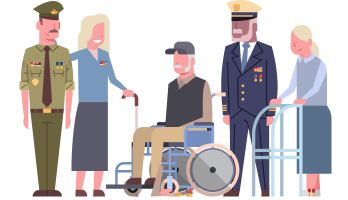How Did Camp Lejeune Water Cause Non-Hodgkin’s Lymphoma?
Between 1953 and 1987, residents, military service members, and civilian employees were exposed to water contamination at Camp Lejeune. This is due to toxic chemicals that were in the drinking water and groundwater at the U.S. Marine Corps base.
In the years following, the water at Camp Lejeune has been linked to an increased risk of non-Hodgkin’s lymphoma, which is a cancer of the lymph system. The toxic water is also tied to other types of cancer and major illness.
Chemicals that were found in the water at Camp Lejeune include:
- Benzene
- Dichloroethylene (DCE)
- Tetrachloroethylene — also known as perchloroethylene (PCE)
- Trichloroethylene (TCE)
- Vinyl chloride
- Other contaminants
After detecting these chemicals at the base in the 1980s, the Agency for Toxic Substances and Disease Registry (ATSDR) began tracking the health effects in people exposed to them.
According to a study published by the National Institutes of Health (NIH), benzene exposure increases the risk of non-Hodgkin’s lymphoma.
Learn if you can pursue financial aid after a non-Hodgkin’s lymphoma diagnosis: File a claim now.
Other Types of Cancer Linked to Camp Lejeune Water
Non-Hodgkin’s lymphoma is just one of many life-threatening health conditions that resulted from exposure to the water supply at Camp Lejeune. Sadly, many people have already passed away from their illnesses.
Other health conditions and cancers linked to Camp Lejeune’s water include:
- Aplastic anemia
- Bladder cancer
- Breast cancer
- Esophageal cancer
- Hepatic steatosis
- Infertility
- Kidney cancer
- Liver cancer
- Lung cancer
- Multiple myeloma
- Myelodysplastic syndromes
- Neurological disorders
- Pancreatic cancer
- Parkinson’s disease
- Prostate cancer
- Renal toxicity
- Sarcoma
- Scleroderma
See a doctor immediately if you or a loved one spent time at Camp Lejeune and has any of the conditions above. You may also qualify to take legal action after developing one or more of these health problems.
Can You File a Camp Lejeune Non-Hodgkin’s Lymphoma Lawsuit?
If you or a loved one has been diagnosed with non-Hodgkin’s lymphoma after spending at least 30 days at Camp Lejeune between 1953 and 1987, you may be eligible to file a Camp Lejeune contamination lawsuit.
Non-Hodgkin’s lymphoma is a type of cancer that affects a person’s lymphatic system and the production of white blood cells and bone marrow.
Symptoms of non-Hodgkin’s lymphoma include:
- Chest pain
- Loss of appetite
- Skin itching
- Swollen lymph nodes
- Weakened immune system
- Weight loss
To find out if you qualify for legal action, contact the Camp Lejeune Claims Center for a free consultation.
Eligibility for Camp Lejeune Non-Hodgkin’s Lymphoma Cases
You may be eligible for a Camp Lejeune non-Hodgkin’s lymphoma case if you can prove some key factors.
You may qualify to file a Camp Lejeune lawsuit if:
- You spent at least 30 days at Camp Lejeune between 1953 and 1987.
- You were not dishonorably discharged from the military.
- You developed non-Hodgkin’s lymphoma or another serious medical condition.
You may also file a wrongful death lawsuit on behalf of a deceased loved one if the previous statements can be proven for them — even if they died many years ago. Call (866) 473-4764 to learn more.
Evidence in a Camp Lejeune Non-Hodgkin’s Lymphoma Claim
In order for a Camp Lejeune non-Hodgkin’s lymphoma claim to be successful, important documentation is necessary.
Evidence for a Camp Lejeune non-Hodgkin’s lymphoma claim includes:
- Records of non-Hodgkin’s lymphoma diagnosis and treatment
- Housing or employment records for Camp Lejeune
- Military service documents
Working with top Camp Lejeune water lawyers may be the best option, as they can help you gather, sort, and submit all your documents and evidence.
What Damages Can You Claim in a Camp Lejeune Lawsuit?
“Damages” is the legal term for the reasons you’re filing a lawsuit.
Damages in Camp Lejeune lawsuits can vary because many illnesses and injuries are associated with the toxic water at the base.
Common damages in a Camp Lejeune lawsuit include:
- Loss of income, benefits, wages
- Medical expenses
- Pain and suffering
- Wrongful death
How Long Do You Have to File a Camp Lejeune Cancer Lawsuit?
The Camp Lejeune Justice Act of 2022 allows those affected by the toxic water at Camp Lejeune to file claims and lawsuits up until August 2024.
With the Camp Lejeune Justice Act, veterans and their family members can continue to file Camp Lejeune water contamination claims and receive payouts from the U.S. government.
No claims will be accepted after August 2024, so don’t wait: File a claim now.
Camp Lejeune Non-Hodgkin’s Lymphoma Lawsuit Settlements
Most lawsuits award compensation through out-of-court settlements. The first lawsuits are just being filed in the wake of the Camp Lejeune Justice Act, so no cases have been settled yet. However, the amount of compensation that Camp Lejeune settlements will pay out may vary based on several factors.
Factors that might affect a non-Hodgkin’s Lymphoma settlement include:
- How much time a person spent at Camp Lejeune
- Their health prior to their time at Camp Lejeune
- Whether they died prematurely as a result of toxic water exposure
- Whether they have a family history of the illness they were diagnosed with
- Whether they received money or benefits for their illness already
The U.S. government is projected to pay out more than $21 billion to veterans with Camp Lejeune-related illnesses like non-Hodgkin’s Lymphoma and their families.
Get Help With a Camp Lejeune Lawsuit
Working with a top Camp Lejeune lawyer is recommended if you are considering filing a lawsuit for Camp Lejeune water contamination.
This can ensure you are able to build the strongest case possible and secure yourself the highest possible settlement for your injuries.
It is important to remember that there is no guarantee of receiving compensation. However, an experienced Camp Lejeune water lawyer can help build your case to get the highest payout possible.
Learn more about filing a Camp Lejeune claim right now.
Camp Lejeune Non-Hodgkin’s Lymphoma FAQs
Who can start a Camp Lejeune non-Hodgkin’s lymphoma lawsuit?
You may be able to file a Camp Lejeune non-Hodgkin’s lymphoma lawsuit if you developed this illness after having spent at least 30 days at the base from 1953 to 1987.
You may also qualify to start a Camp Lejeune non-Hodgkin’s lymphoma lawsuit on behalf of a family member who passed away from non-Hodgkin’s lymphoma after exposure to toxic chemicals at Camp Lejeune.
Will I lose my VA benefits if I start a Camp Lejeune case?
Starting a case will not affect health care or disability benefits for veterans harmed by Camp Lejeune’s water.
A Camp Lejeune lawsuit may earn you an additional settlement or payout from the federal government for damages if you are found to be eligible for one.
How is Camp Lejeune connected to non-Hodgkin’s lymphoma?
The volatile organic compounds (VOCs) found in the drinking water at Camp Lejeune are carcinogens, which are substances known to cause cancer.
Non-Hodgkin’s lymphoma is one of the original presumptive conditions associated with the toxic drinking water at Camp Lejeune.
How much is a Camp Lejeune water contamination claim worth?
None of these claims have been settled yet so there are no reported settlement values. Our team will provide examples of settlement payouts once the first cases have concluded.
There are many types of injuries and illnesses associated with the toxic water contamination at Camp Lejeune, so each claimant will likely receive a unique compensation payout.
The Congressional Budget Office has predicted that total payouts and settlements for all those affected will exceed $21 billion.



